
Frederick Martin MacMurray was an American actor. He appeared in more than one hundred films and a successful television series in a career that spanned nearly a half-century. His career as a major film leading man began in 1935, but his most renowned role was in Billy Wilder's film noir Double Indemnity. From 1959 to 1973, MacMurray appeared in numerous Disney films, including The Shaggy Dog, The Absent-Minded Professor, Follow Me, Boys!, and The Happiest Millionaire. He starred as Steve Douglas in the television series My Three Sons.
The year 1938 in film involved some significant events.

Holy Cross Cemetery is a Catholic cemetery at 5835 West Slauson Avenue in Culver City, California, operated by the Los Angeles Archdiocese.

Catherine Rosalind Russell was an American actress, comedian, screenwriter, and singer, known for her role as fast-talking newspaper reporter Hildy Johnson in the Howard Hawks screwball comedy His Girl Friday (1940), opposite Cary Grant, as well as for her portrayals of Mame Dennis in Auntie Mame (1958) and Rose in Gypsy (1962). A noted comedienne, she won all five Golden Globes for which she was nominated. Russell won the Tony Award for Best Actress in a Musical in 1953 for her portrayal of Ruth in the Broadway show Wonderful Town. She was nominated for the Academy Award for Best Actress four times during her career before being awarded a Jean Hersholt Humanitarian Award in 1973.

Lloyd's of London is a 1936 American historical drama film directed by Henry King. It stars Freddie Bartholomew, Tyrone Power, Madeleine Carroll, and Guy Standing. The supporting cast includes George Sanders, Virginia Field, and C. Aubrey Smith. Loosely based on historical events, the film follows the dealings of a man who works at Lloyd's of London during the Napoleonic Wars. Lloyd's of London was a hit; it demonstrated that 22-year-old Tyrone Power, in his first starring role, could carry a film, and that the newly formed 20th Century Fox was a major Hollywood studio.
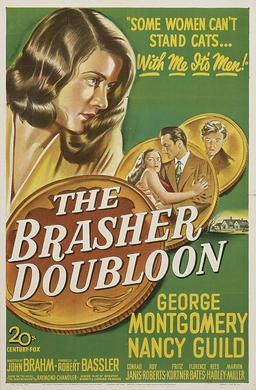
The Brasher Doubloon is a 1947 American crime film noir directed by John Brahm and starring George Montgomery and Nancy Guild. It is based on the 1942 novel The High Window by Raymond Chandler.

John J. Mescall, A.S.C. was an American cinematographer. He photographed such silent films as Ernst Lubitsch's The Student Prince in Old Heidelberg (1927), but he is best known for his work in the 1930s at Universal Pictures, where he often worked on the films of James Whale. Mescall was famous for his elaborate, some might say grandiose, effective camera movements, in which the camera would often track completely across or around a set, or even one performer. He did not always use these kinds of camera movements, but his most famous films all have them.
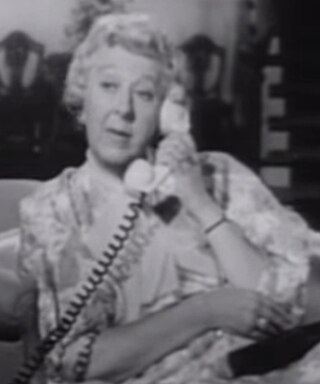
Norma Varden Shackleton, known professionally as Norma Varden, was an English-American actress with a long film career.

Auntie Mame is a 1958 American Technirama Technicolor comedy film based on the 1955 novel of the same name by Edward Everett Tanner III and its 1956 theatrical adaptation by Jerome Lawrence and Robert Edwin Lee. This film version stars Rosalind Russell and was directed by Morton DaCosta. It is not to be confused with a musical version of the same story that appeared on Broadway in 1966 and was later made into a 1974 film, Mame, starring Lucille Ball as the title character.

Charles E. Arnt was an American film actor from 1933 to 1962. Arnt appeared as a character actor in more than 200 films.
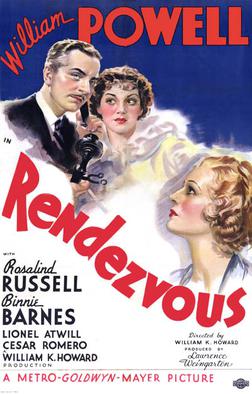
Rendezvous is a 1935 American spy film set in World War I, directed by William K. Howard, starring William Powell and Rosalind Russell and featuring Binnie Barnes, Lionel Atwill, Cesar Romero and Samuel S. Hinds. Powell plays an American cryptologist who tangles with German spies while falling in love.

Flight for Freedom is a 1943 American drama film directed by Lothar Mendes and starring Rosalind Russell, Fred MacMurray and Herbert Marshall. Film historians and Earhart scholars consider Flight for Freedom an à clef version of Amelia Earhart's life story, concentrating on the sensational aspects of her disappearance during her 1937 world flight. The film's ending speculated that the main character's disappearance was connected to a secret mission on behalf of the U.S. government. As a propaganda film, the Japanese characters in Flight for Freedom were portrayed as devious and evil.

Tell It to the Judge is a 1949 American romantic comedy film directed by Norman Foster and starring Rosalind Russell as a divorcee who tries to get back her ex-husband, played by Robert Cummings.
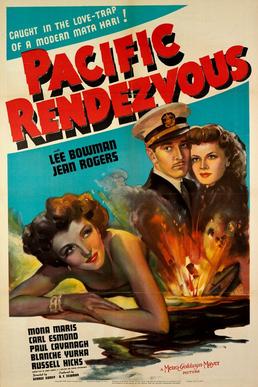
Pacific Rendezvous is a 1942 American mystery film directed by George Sidney. It stars Lee Bowman and Jean Rogers.

The Witness Chair is a 1936 American courtroom drama film directed by George Nicholls, Jr. and starring Ann Harding, Walter Abel and Douglass Dumbrille.

The Casino Murder Case is a 1935 American mystery film starring Paul Lukas and Alison Skipworth. Rosalind Russell is in the supporting cast. It was directed by Edwin L. Marin from a screenplay by Florence Ryerson and Edgar Allan Woolf, based on the 1934 novel of the same name by S. S. Van Dine. It was the ninth film in the Philo Vance film series.
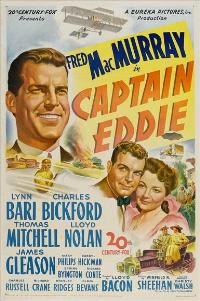
Captain Eddie is a 1945 American drama film directed by Lloyd Bacon, based on Seven Were Saved by "Eddie" Rickenbacker and Lt. James Whittaker's We Thought We Heard the Angels Sing. The film stars Fred MacMurray, Lynn Bari and Charles Bickford. Captain Eddie is a "biopic" of Rickenbacker, from his experiences as a flying ace during World War I to his later involvement as a pioneering figure in civil aviation, and his iconic status as a business leader who was often at odds with labour unions and the government.

Susie Steps Out is a 1946 American comedy film directed by Reginald Le Borg, written by Elwood Ullman and Fred Freiberger, and starring David Bruce, Cleatus Caldwell, Nita Hunter, Howard Freeman, Grady Sutton and Margaret Dumont. It was released on December 13, 1946 by United Artists.
Rosalind Murray was a British-born writer and novelist known for The Happy Tree and The Leading Note.
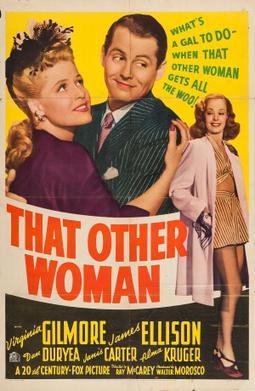
That Other Woman is a 1942 American comedy film directed by Ray McCarey, written by Jack Jungmeyer, and starring Virginia Gilmore, James Ellison, Dan Duryea, Janis Carter, Alma Kruger and Lon McCallister. It was released on November 13, 1942, by 20th Century Fox.


















